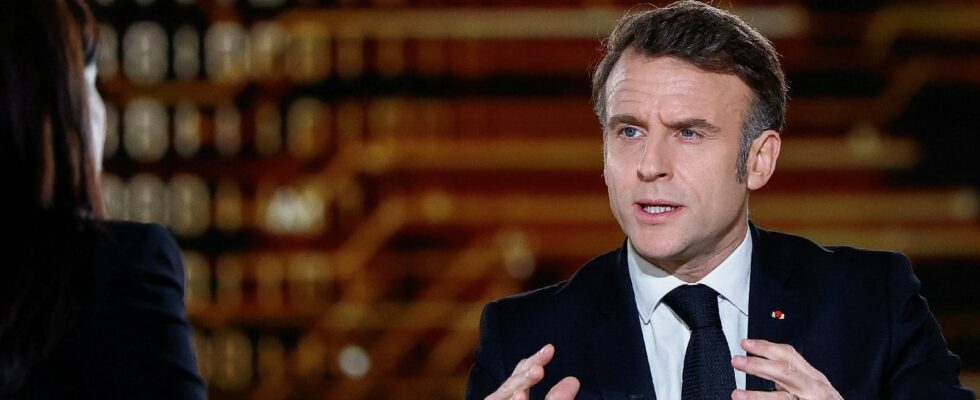The annoying question tirelessly returns. “Will Elon Musk come to the top of AI in Paris?” There is no longer the number of times it has been placed during “off -off” or in the Elysian Whatsapp loop dedicated to the world event that France organizes these February 10 and 11. The palace repeats the same catchphrase: “Yes, Mr. Musk was invited”; “No, he has not yet confirmed his arrival.”
An impromptu visit now seems highly improbable. The Elysée had prepared the field, trying as best they can to make the media understand that Elon Musk would not be the star of the summit. We could see there the speech of a pretender thrown by the richest man in the world, which had been the feeling of the world summit of Londonian AI last year. We would be wrong.
The Elysée has in fact skillfully managed this trapped dossier by honoring a man much more useful to the ambitions of France and Europe in AI: Narendra Modi. In mid-January, France revealed that the Indian Prime Minister would coach the high mass to which it invited stars of AI such as Sam Altman (Openai), Fei-Fei Li (Stanford) or the Turing price Yann Lecun (Meta) as well as leading policies, from the American vice-president JD Vance to the Chinese Deputy Prime Minister Zhang Guoqing. Emmanuel Macron also made the choice, on Sunday, to grant an exclusive interview to a duo of French and Indian journalists: Laurent Delahousse de France 2 and Palki Sharma Upadhyay from First Post.
A clever strategy because the United States will in reality help France in AI. Not to mention the questionable political campaigns that Elon Musk leads on the old continent, the Americans have only one objective: to become the undisputed masters of this technology. Their start-ups IA aspire an overwhelming share of risk capital money (61 % of investments in 2023 against 6 % in Europe). Their citizens and their businesses are already spoiled for choice in terms of tools: alongside Openai appeared national competitors such as Anthropic and Xai. And all the American digital giants (Google, Amazon, Microsoft, Meta, etc.) integrate more and more sophisticated AI suite. The American market is saturated.
The appetite Indian market for the French of AI
That of the European Union has the advantage of being larger (450 million people against only 335 million in the United States). And the commission finally seems to be decided to help EU companies to take advantage of them. The worrying diagnosis of the Draghi report made an impression. The aggressive postures of Donald Trump and Elon Musk against their allies too. But the sites to be led to relaunch the European competitive – administrative simplification, unification of the market … – will not be done in a jiffy.
Betting on India is ingenious in this context. With 1.4 billion inhabitants, the country represents a colossal market. Especially since India has a young population – under 35 for almost two thirds – and a well developed tech sector – 7.5 % of the country’s GDP. Its software and computer advice giants (Infosys, Wipro, TCS, etc.) have both pressing need and means to have IA tools.
Like France, India finally savoring the idea of digging a third way. “We want to work with the United States. We want to work with China, but we do not want to depend on any of them,” said Emmanuel Macron, Sunday evening on the set co-animated by First Post and France 2.
France has two assets that may interest New Delhi. First, its elite courses that high -flying IA experts come out each year, capable of creating large models of cutting -edge language. It is thanks to this that with Mistral, it is one of the rare countries to compete today with the US and China in the field of Frontier Models, Or the most powerful models. The German Aleph Alpha has thrown the sponge. India, on the other hand, is not currently present on this floor of the competition. Nuclear expertise is another tricolor asset that is very interested in New Delhi. Ads are also expected concerning SMRs, these small modular reactors that tech players are now tearing.
Since Jacques Chirac’s refusal to sanction Indian nuclear tests in 1998, relations between India and France have been significantly strengthened, despite the darker facets of the Hindu nationalist government. Energy, armament, infrastructure … There are many common interests. This is the seventh time that Narendra Modi has been coming to Paris since the start of his first mandate in 2014.
Emmanuel Macron unrolls the red carpet for two days. In addition to the place of honor he has in store for him at his great AI world summit, the French president has planned to go inaugurate with him the new Indian consulate in Marseille, before visiting the site of the experimental reactor in his company of cadarache nuclear fusion. Paris does not save. Because the Americans of the AI are on the war foot and also cover India with attentions. Sam Altman, the boss of Openai was there just last week.
.
